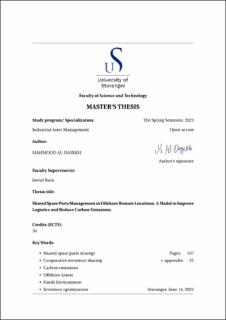| dc.description.abstract | The management of spare parts poses significant challenges, particularly in offshore remote locations. The combination of the remoteness of these locations and harsh environmental conditions adds complexity to the process of timely delivery of spare parts. As a result, lead times are prolonged and operational downtime is increased, leading to substantial financial losses for companies.
The lack of simulation models limits the practical application of sharing spare parts strategy, hindering understanding of their potential benefits, costs, and challenges. This gap hinders the implementation of the concept of sharing spare parts management and prevents their adoption in real-world scenarios
To address this gap, a simulation model was developed to manage spare parts across three offshore locations in the Barents Sea. The focus lies in exploring the benefits of sharing spare parts strategy among platforms, particularly regarding lead times, CO2 emissions, carbon tax costs, and reuse of spare parts among these platforms.
The study follows a quantitative approach using AnyLogic software for simulation. Various factors, including storage capacities, vessel speed, carbon emissions, and carbon tax costs, were incorporated into the model. The research design consists of four stages: conceptualization, model structuring, parameterization, and validation. A case study approach is used, with data from three common equipment types across
three criticality classes.
Through a comparison between the baseline scenario and the solution scenario, the results demonstrate the effectiveness of the proposed concept of sharing spare parts. It reduced trips to the onshore warehouse by 42%, decreased total traveling time, CO2 emissions, and carbon tax costs by 48.6% each, and optimized lead times and inventory management. These results underscore the potential benefits of sharing spare parts systems, providing a pathway for more efficient and sustainable spare parts management in offshore operations. | |
